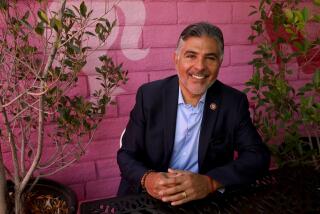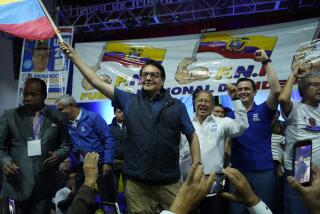Marcos Crony Plans to Run for President : Philippines: He was the former leader’s closest and richest friend. His appeal is called a reflection of the nation’s unstable political and economic situation.
- Share via
MANILA — In a move likely to further polarize this politically unstable nation, Eduardo (Danding) Cojuangco, considered the closest and richest crony of former President Ferdinand E. Marcos, plans to run for president of the Philippines in 1992 under a new party banner.
Cojuangco has told friends that he will join the newly created Partido Pilipino and announce his bid next spring. Cojuangco will not speak for quotation but confirmed his plans in a lengthy conversation with The Times last week.
Cojuangco fled the Philippines with Marcos in February, 1986. He spent nearly four years in exile in Long Beach, Calif., before returning to Manila last November under still-unexplained circumstances. His political plans have been a matter of intense speculation.
Despite his ties to the disgraced dictator, analysts say the burly, 55-year-old business tycoon is likely to be a strong contender in a field led by Defense Secretary Fidel V. Ramos and House Speaker Ramon Mitra. President Corazon Aquino has said she will not run for reelection.
“The fact Danding is a serious candidate is in itself a reflection of the dire straits the democratic process finds itself in here,” said one Western diplomat. “The more difficult the political and economic situation becomes, the stronger his appeal.”
In a sign of Cojuangco’s growing influence, a senior U.S. Embassy official recently traveled to Cojuangco’s giant sugar hacienda on Negros Island for a lengthy meeting. The session was unusual because embassy officials previously were told to avoid Cojuangco, fearing that any contact might suggest support for an Aquino opponent.
Cojuangco is Aquino’s cousin, but they are bitterly estranged. She has accused him of financially supporting last December’s failed military coup, which began a week after he arrived in Manila.
Cojuangco has denied any involvement, and a spokesman for a presidential fact-finding commission studying the rebellion, in which 113 were killed, said the panel found no hard evidence linking Cojuangco to the coup plotters.
But he still faces at least two civil suits and eight criminal charges stemming from his Marcos-era takeover of a Manila newspaper and his monopoly control of the nation’s giant coconut industry. The Aquino government has sequestered hundreds of millions of dollars worth of Cojuangco’s former businesses, property and assets.
University of the Philippines political scientist Randolf David says that, despite Cojuangco’s tainted background, he appeals to Filipinos as an old-style political “patron” in what is still a largely feudal society.
More to Read
Sign up for Essential California
The most important California stories and recommendations in your inbox every morning.
You may occasionally receive promotional content from the Los Angeles Times.













